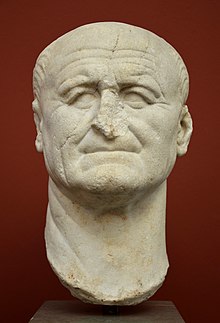
Back Vespasianus Afrikaans ቤስጳስያን Amharic Vaspasián AN فسبازيان Arabic فسبسيان ARZ Vespasian Azerbaijani وسپاسیان AZB Веспасіян Byelorussian Вэспасіян BE-X-OLD Веспасиан Bulgarian
| Vespasian | |||||
|---|---|---|---|---|---|
 Bust at the Ny Carlsberg Glyptotek | |||||
| Roman emperor | |||||
| Reign | 1 July 69 – 23 June 79 | ||||
| Predecessor | Vitellius | ||||
| Successor | Titus | ||||
| Born | Titus Flavius Vespasianus 17 November 9 AD[1] Falacrinum, Italy | ||||
| Died | 23 June 79 (aged 69)[4] Aquae Cutiliae | ||||
| Burial | Rome | ||||
| Spouses |
| ||||
| Issue Detail | |||||
| |||||
| Dynasty | Flavian | ||||
| Father | Titus Flavius Sabinus | ||||
| Mother | Vespasia Polla | ||||
Vespasian (/vɛˈspeɪʒ(i)ən, -ziən/; Latin: Vespasianus [wɛspasiˈaːnʊs]; 17 November AD 9 – 23 June 79) was Roman emperor from 69 to 79. The last emperor to reign in the Year of the Four Emperors, he founded the Flavian dynasty, which ruled the Empire for 27 years. His fiscal reforms and consolidation of the empire brought political stability and a vast building program.
Vespasian was the first emperor from an equestrian family and only rose later in his lifetime into the senatorial rank, the first of his family to do so. Vespasian's renown came from his military success;[6] he was legate of Legio II Augusta during the Roman invasion of Britain in 43 and subjugated Judaea during the Jewish rebellion of 66.[7]
While Vespasian besieged Jerusalem during the Jewish rebellion, emperor Nero committed suicide and plunged Rome into a year of civil war known as the Year of the Four Emperors. After Galba and Otho perished in quick succession, Vitellius became emperor in April 69. The Roman legions of Roman Egypt and Judaea reacted by declaring Vespasian, their commander, the emperor on 1 July 69.[8]
In his bid for imperial power, Vespasian joined forces with Mucianus, the governor of Syria, and Primus, a general in Pannonia, leaving his son Titus to command the besieging forces at Jerusalem. Primus and Mucianus led the Flavian forces against Vitellius, while Vespasian took control of Egypt. On 20 December 69, Vitellius was defeated, and the following day Vespasian was declared emperor by the Senate.[9]
Little information survives about the government during Vespasian's ten-year rule. He reformed the financial system of the Roman Empire after the campaign against Judaea ended successfully, and initiated several ambitious construction projects, including the building of the Flavian Amphitheatre, better known today as the Roman Colosseum. Through his general Agricola, Vespasian increased imperial expansion in Britain. Vespasian is often credited with restoring political stability to Rome following the chaotic reigns of his predecessors. After he died in 79, he was succeeded by his eldest son Titus, thus becoming the first Roman emperor to be succeeded by his natural son and establishing the Flavian dynasty.
- ^ Suetonius, Vesp., 2. "Vespasian was born [...] on the evening of the fifteenth day before the Kalends of December, in the consulate of Quintus Sulpicius Camerinus and Gaius Poppaeus Sabinus, five years before the death of Augustus."
- ^ Suetonius, Titus 11: "[He died] two years two months and twenty days after succeeding Vespasian".
- ^ Cassius Dio LXVI.18: "For he lived after this only two years, two months and twenty days".
- ^ Suetonius gives 23 June (VIIII. Kal. Iul.). However, he also states that he died "at the age of sixty-nine years, seven months and seven day", i.e. he died on 24 June, although it's possible that he's using inclusive counting. Cassius Dio (66.17) states that he "reigned ten years lacking six days", i.e. he died on 25/24 June. Both authors date Titus' ascension on 24 June.[2][3]
- ^ Cooley, p. 490.
- ^ The Mammoth Book of Roman Whodunnits. Edited and had non-fictional passages written by Michael Ashley, Introduction by Steven Saylor. New York: Carroll & Graf Publishers. 2003. p. 198. ISBN 0-7867-1241-4. OCLC 53474742.
{{cite book}}: CS1 maint: others (link) - ^ Levick, pp. 16–38.
- ^ Scott, Kenneth (1932). "On Suetonius' Life of Vespasian 12". Classical Philology. 27 (1): 83. doi:10.1086/361434. ISSN 0009-837X. JSTOR 265251. S2CID 161746778. Archived from the original on 22 May 2021. Retrieved 21 May 2021.
His tribunician power was reckoned from July 1, 69, the day when he was proclaimed emperor by the army
- ^ Roberts (2007).
© MMXXIII Rich X Search. We shall prevail. All rights reserved. Rich X Search